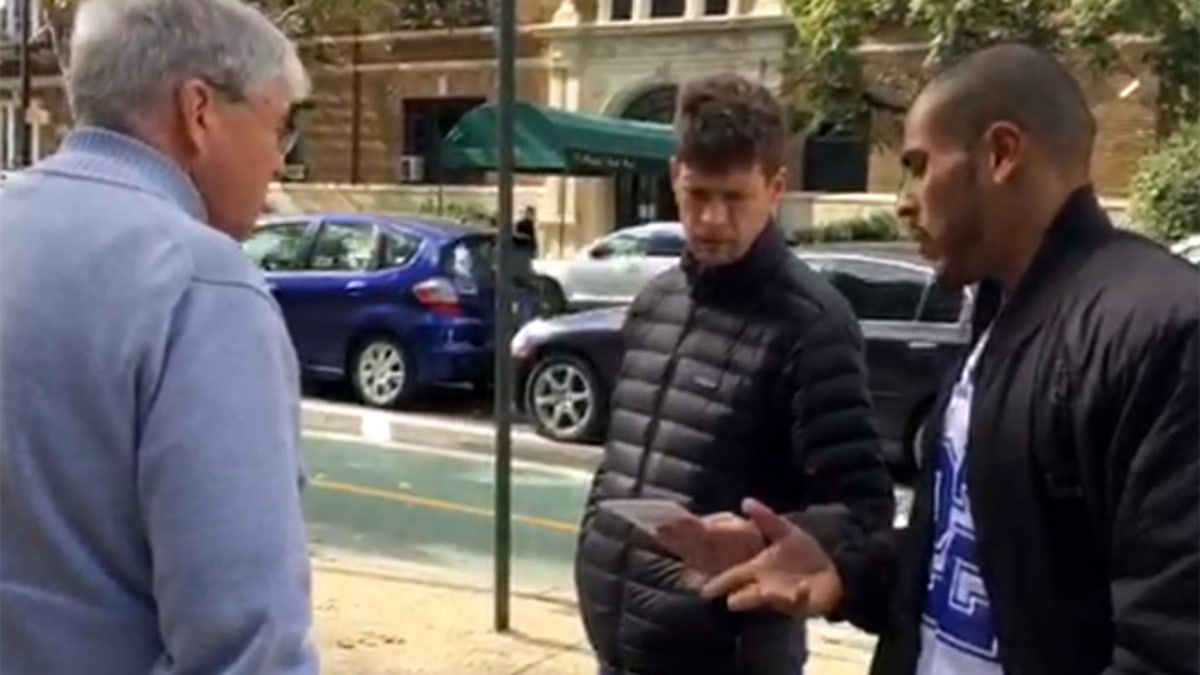
PROP volunteers met in October to hand out fake summonses in more affluent neighborhoods in Brooklyn. (Police Reform Organizing Project)
A New Yorker who believes cops discriminate against minorities has adopted a police tactic to make his point, handing out his own "summonses" to whites in affluent neighborhoods for infractions he says are selectively enforced.
Riding a bike on the sidewalk, jay-walking or carrying an open beer can bring a costly ticket in some sections of the Big Apple, yet barely register with police in others, according to Robert Gangi, co-founder of the Police Reform Organizing Project.
“White people in [the affluent Brooklyn neighborhood of] Park Slope virtually never get ticketed for these kind of activities whereas African-American and Latino people in different neighborhoods in this city will get sanctioned — ticketed and sometimes arrested,” he said recently, according to Wagingnonviolence.org.
Gangi's group next plans to hand out its fake summonses in the tony Upper East Side neighborhood near Gracie Mansion, where Mayor Bill de Blasio lives.
“We think that that will send him a message loud and clear,” Gangi said.
During a PROP ticket blitz in Park Slope last October, Gangi and a group of volunteers handed wrongdoers and scofflaws summonses along with pamphlets explaining their purpose. Recipients were informed they weren't really being penalized, but told, according to The New Yorker, that "you very well might have if you were in a different neighborhood and a person of color.”’
Gangi said some of those who were stopped signed a petition calling for policing reforms, while others just kept going.
Gangi’s organization claims, its data reveals an imbalance in policing. In minority neighborhoods like Bedford-Stuyvesant, Brooklyn, there are, on average 2,000 summonses handed out per year from 2009 to 2011. In Park Slope, a more affluent neighborhood, the statistics show an average of eight are given out.
Gangi claims that city police precincts in low-income neighborhoods have quotas for summonses, which the NYPD has long denied.
The NYPD did not respond to a FoxNews.com request for comment on the issue.
Gangi and other police critics fault the so-called "broken windows" theory, widely credited for bringing down crime in New York and other major cities during the 1990s. The theory holds that enforcement of minor laws creates a climate of order that prevents more serious laws from being flouted.
Gangi said that police officers in certain precincts in low-income, minority areas are given quotas and unfairly target minorities.
The broken windows theory has been criticized as a license for selective enforcement, and has come under increasing fire as tensions between police and minority communities have increased.
George L. Kelling, one of the co-founders of the Broken Windows theory, wrote an op-ed in Politico last summer defending his theory titled, “Don’t Blame My ‘Broken Windows’ Theory for Poor Policing.”
“Despite these and other criticisms, the demand for order remains high in minority and poor communities,” he wrote. “And I would argue that our theory has been largely misunderstood.”
Kelling told FoxNews.com that police respond to demand.
"You go where the problems are," he said. "Once police start ignoring these high-crime areas, that, too, is dicriminatory in another way."
He said summonses should be given out fairly, regardless if the offender is drinking wine during a picnic in Central Park or drinking a beer inside a park in a low-income neighborhood. But bad policing should not reflect poorly for the effectiveness of broken windows.
"At one time, criminal investigation involved torture," he said. "Just because something was wrong, it didn't mean we should do away with criminal investigations all together."
A police officer who patrols a high-crime neighborhood in New York told FoxNews.com that stopping people for seemingly minor crimes such as biking on the sidewalk can prevent more serious crimes, making enforcement a good example of the broken windows theory in action.
Gang members often have young teens transport weapons for them in order to minmize their own exposure to the law. Stopping a youngster for riding on the sidewalk could lead to discover of a gun in a backpack, for instance, he said.
“If the kid is stopped with the gun, he’s a kid,” the police officer said. “It’s risky for an adult to carry a gun in public.”

